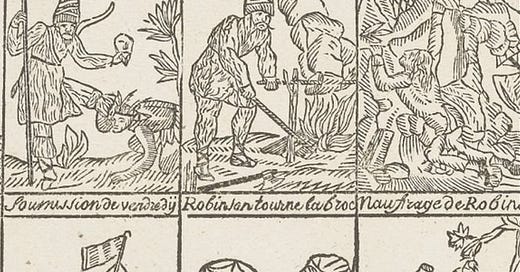Dear classics readers,
I am very excited to announce our July read-along! We’ll read Daniel Defoe’s Robinson Crusoe, one of the most influential and widely published books of all time – and a contender for the first novel in the English language.
What is it?
After a sequence of storms, pirate attacks and shipwrecks, the mariner Robinson Crusoe is washed up on a desert island off the coast of Venezuela, without food, shelter or clothes. How does he survive? The original full title provides some clues:
The Life and Strange Surprizing Adventures of Robinson Crusoe, of York, Mariner: Who lived Eight and Twenty Years, all alone in an un-inhabited Island on the Coast of America, near the Mouth of the Great River of Oroonoque; Having been cast on Shore by Shipwreck, wherein all the Men perished but himself. With An Account how he was at last as strangely deliver’d by Pyrates. Written by Himself.
Defoe based his bestselling novel on the genuine experiences of Alexander Selkirk, a Scottish castaway who spent four years on an uninhabited island in the South Pacific with nothing but a musket, a hatchet, a knife, a cooking pot, a Bible and some bedding.
Why are we reading it?
Robinson Crusoe is the original castaway narrative. Many contemporary readers believed it was a genuine travel account. It has been to immensely popular and influential over the last 300 years that the term ‘Robinsonade’ has been coined for the wealth of literature, film and television series it has inspired.
Which edition should I read?
Robinson Crusoe has a particularly complex textual history. Within Defoe’s lifetime there were seven numbered editions, two of which had separate double printings, all with variations. Since then there have been more than 700 versions in different languages and abridgements.
I suggest we read the Oxford World’s Classics edition, with an introduction by Thomas Keymer and notes by Keymer and James Kelly. It’s based on the 1719 first edition and is easily available in the UK and the US.
How will we read it?
Robinson Crusoe is 250 pages long in the Oxford World’s Classics edition.
This edition has no chapters or section breaks (unlike some versions, which have been divided variously into 20, 27 and 31 chapters).
I suggest we read it over four weeks:
We’ll start reading on Friday 4th July.
On Friday 11th July we’ll discuss the first quarter of the book, pp. 5-66, from ‘I was born in the Year 1632, in the City of York . . .’ to ‘. . . as may be observ’d hereafter upon a very remarkable Occasion.’
On Friday 18th July we’ll discuss the second quarter of the book, pp. 66-130, from ‘During this Time, I made by Rounds in the Woods for Game every Day . . .’ to ‘. . . and what strange unaccountable Whimsies came into my Thoughts by the Way.’
On Friday 25th July we’ll discuss the third quarter of the book, pp. 131-194, from ‘When I came to my Castle, for so I think I call’d it ever after this . . .’ to ‘. . . I hung my great Sword as usual, naked by my Side, and gave Friday his Hatchet.’
On Friday 1st August we’ll discuss the last quarter of the book, pp. 195-258, from ‘When I had thus prepar’d my self, I took my Perspective-Glass . . .’ to ‘. . . I may perhaps give a farther Account of hereafter.’
(Page numbers refer to the Oxford edition.)
What if I don’t want to read it?
If you don’t want to read Robinson Crusoe, you can opt out of our read-along emails and conversation. Just follow this link to your settings and under Notifications slide the toggle next to ‘Robinson Crusoe’. A grey toggle means you will not receive emails relating to this title.
If you buy a copy of Robinson Crusoe through Bookshop.org (UK) or Bookshop.org (US), Read the Classics will earn a commission from your purchase. Thank you in advance for your support!






Looking forward to reading this for the first time not only because it’s one of the most famous classics I’ve not read. It just happens that I’m currently reading the Moonstone by Wilkie Collins and the book opens with an account by the manservant Betteredge who has a copy of Robinson Crusoe permanently at his side and refers to it constantly for wisdom and comfort. He states another book such as RC has never been written and never will be again.
I’ll be joining this read-along. My edition has 27 chapters and I’ve found your reading breaks, which leads me to believe my edition may be cut off as the first three sections are approximately 100 pages while the last section is only approximately 70 pages and ends with, “having been thirty and five years absent” rather than the ending you gave, “I may perhaps give a farther account of hereafter.” I’ll figure it out, though.